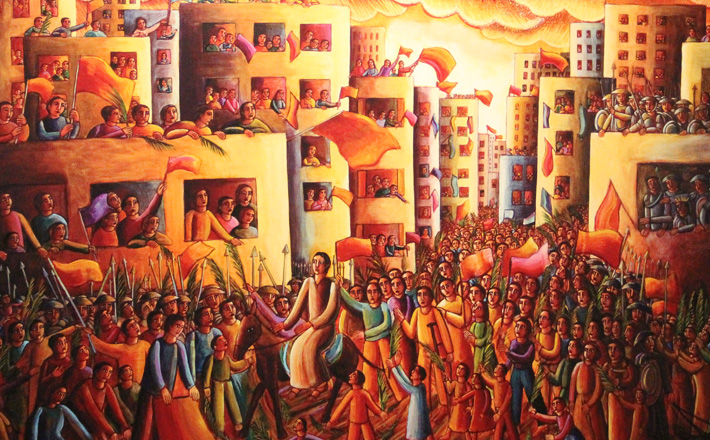Commentary on Luke 19:29-44
The journey that began ten chapters ago is almost over: “When the days drew near for him to be taken up, [Jesus] set his face to go to Jerusalem” (Luke 9:51).
Immediately after that, Jesus was rejected by a Samaritan village. James and John wanted to call down fire to destroy those Samaritans, but Jesus rebuked them and they went on to another village. That event was a prelude to what will soon take place in Jerusalem: the deadly rejection of Jesus, his refusal to take revenge on his enemies, and his determination to follow God’s call wherever it would take him.
But did God want this to happen? It seems that everything was pre-arranged. The donkey was tied where Jesus said it would be and the owners asked the exact question Jesus predicted: “Why are you untying the colt?” They raised no argument when the disciples answered as Jesus instructed: “The Lord needs it.” Perhaps the owners of the donkey were also followers of Jesus. We cannot be certain how Jesus knew about the donkey — or how he will know about the man carrying the water jar in preparation for the Passover meal (22: 10-13).
Jesus had already spoken three times about what will take place in Jerusalem, things that remain hidden from his disciples. Jesus knows that being faithful to God will lead him into the heart of danger, but this does not mean that God wanted him to die. “Rather, Jesus’ death was an act of violence brought about by threatened human men, as sin, and therefore against the will of a gracious God. It occurred historically in consequence of Jesus’ fidelity to the deepest truth he knew … ”1 That deep truth set him on this journey to Jerusalem and he will not be stopped now that he and his disciples have arrived at the Mount of Olives.
As Jesus rode along on the borrowed donkey, people spread their cloaks on the road. We expect them to be waving branches of some kind, even though palms appear only in John’s gospel. But no one is waving branches here, only taking off their coats. Were these people from Bethphage and Bethany or had they followed Jesus from Galilee?
Perhaps it depends on how we interpret the word “disciples.” Luke tells us “the whole multitude of disciples began to praise God.” A whole multitude must have been larger than twelve! As they moved into the city, they sang without a bulletin or a hymnal: “Blessed is the king who comes in the name of the Lord!” (Psalm 118) They borrowed a line the angels sang to the shepherds: “Peace in heaven, and glory in the highest heaven!” To some authorities, it sounded like a dangerous song: Blessed is King Jesus — we shall not be moved! Peace in highest heaven – we shall not be moved!
Who were these people who had seen Jesus’ deeds of power? Zacchaeus was probably up in front. Jesus had just stayed with him in Jericho and that encounter changed Zacchaeus forever. Mary Magdalene, Joanna, and Mary the mother of James must have been there for they’ll be remembered by name at the empty tomb.
Other women were there, too, because Luke places them at the cross on the day of Jesus’ crucifixion. (23:49) Maybe the woman who anointed Jesus’ feet at Simon’s dinner party was there. Jairus and his daughter might be there, too, walking with the woman cured of the twelve-year hemorrhage. The woman who had been bent over for 18 years is standing tall and there are lots of children for Jesus made it clear they were always welcome.
These were the ones who had seen Jesus’ deeds of power. John the Baptist had said it would be so back in Luke 3. When religious leaders claimed their special inheritance, John said, “I tell you, God is able from these stones to raise up children to Abraham.” Now those stones had come to life! People treated like nobodies were walking like somebodies! It was glorious.
It was scary. Do we really want stones to come to life? Do we want to invite the poor and the crippled, the blind and the lame into the sanctuary? (Luke 14:13) Do we want people praising God who can’t find the right page in the hymnal?
“Teacher, order your disciples to stop.”
“I tell you,” said Jesus, “if these were silent, the stones would shout out.”
Who is shouting to be heard this Holy Week? Followers of Jesus are called to listen to those who have been silenced. When we do, the Gospel comes alive in radically new ways. Who is longing to be heard where we are?
- the man with Down Syndrome who delivers the mail in your office building
- the women and men who come to community lunch in the church basement
- the immigrant women who care for our aging parents
- the transgender teenager at Trinity Place shelter in New York City
- the man who stands outside the grocery store every day with a cup in his hand
What stories do they long to tell? Will we walk past without stopping? “I tell you,” said Jesus, “if these were silent, the stones would shout out.”
When we refuse to listen or see those who have been silenced, we hear Jesus weeping once again over our cities and our churches. “If you, even you, had only recognized on that day the things that make for peace!” Jesus seems to speak to us when he says, “even you,” looking beyond that day in Jerusalem into our own time. Jesus will not call down fire upon his enemies. His face is set on God’s mission and he will not turn around until all is accomplished. Jesus rides into Jerusalem sustained by the words that will be his last from the cross: “Father, into your hands I commend my spirit.”
Notes:
1 Elizabeth A. Johnson, She Who Is: The Mystery of God in Feminist Theological Discourse (New York: Crossroad Publishing Company, 1993), 158.
PRAYER OF THE DAY
Hosanna, King,
Blessed are you, our king, who comes in the name of the Lord! Peace in heaven, and glory in the highest heaven! Even if our voices were silenced, creation itself would rise up to praise you! Hosanna in the Highest! Amen.
HYMNS
My song is love unknown ELW 343, H82 458, NCH 222
All glory, laud, and honor ELW 344, H82 154, 155, UMH 280, NCH 216, 217
Prepare the royal highway ELW 264
Prepare the way, O Zion H82 65
Prepare the way of the Lord UMH 207
CHORAL
Ride on, King Jesus, Larry Fleming


April 9, 2017